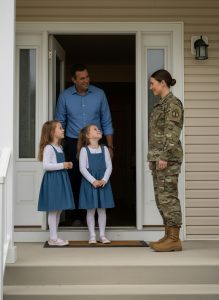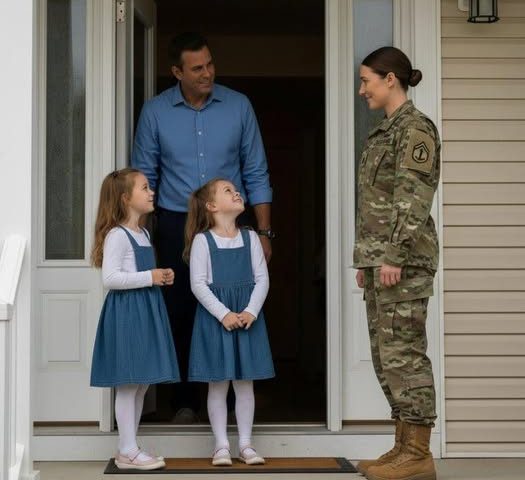After three long tours overseas, I returned home to a message from my husband: “Don’t come back. The locks are changed. The kids don’t want you. It’s over.” I replied with only three words: “As you wish.” One call to my lawyer shifted the balance. By the next day, his lawyer was the one begging
The message appeared just past midnight, blinking on Captain Emily Carter’s phone as she rode in the back of a taxi from the airport.
“Don’t bother coming back. I’ve changed the locks. The kids don’t want you. It’s finished.”
Her husband’s words pierced deeper than any injury she’d sustained in combat. Three deployments, three years of enduring desert heat, gunfire, and relentless responsibility—and this was her homecoming. Emily stared at the screen, numb. Then she typed three words, steady and deliberate: “As you wish.”
No anger. No begging. Just closure.
As the cab pulled into her quiet Virginia neighborhood, she already knew what she would do next. The porch light glowed on the house she’d funded with hazard pay and sleepless nights, but the key in her hand was now worthless. She didn’t even attempt the lock.
Instead, she called the one number that mattered now: her attorney, Lisa Grant.
Lisa answered on the first ring. “Emily? What’s happened?”
“He’s locked me out. Claims the twins don’t want me. I’m outside right now.”

A pause. Then Lisa’s voice turned steel. “Don’t go in. Come to my office in the morning. We’ll handle this properly.”
Emily ended the call, breathing steadily, her training kicking in. Combat had taught her discipline. She wouldn’t force her way in. Not yet.
Another message appeared. This time from David: “Don’t come back. The girls are better off without a mother who walked away.”
Emily closed her eyes, the accusation burning. Walked away? She had served so her daughters—Sophie and Claire—could live freely. Every sacrifice had been for them.
The next morning, over strong coffee in Lisa’s office, the battle lines were drawn. “He can’t just erase you from their lives,” Lisa said firmly. “You’ve served honorably. The court will recognize that. And if he’s been manipulating the girls, we’ll prove it.”
By midday, the legal filings were submitted. That evening, David’s attorney called—no longer smug. The strength behind Emily’s calm “As you wish” had become clear.
David had underestimated the soldier he married. The real war—the fight for her daughters—was just beginning.
The first hearing was set for two weeks later. Emily prepared as she would for a mission—meticulously. She compiled call logs, letters from deployment, photos from video birthdays, and drawings her daughters had sent: evidence that she’d stayed connected, even from afar.
But the hardest part was the silence. David had cut off direct contact, claiming they didn’t want to speak to her. Emily suspected otherwise. Lisa confirmed her instincts. “Parental alienation. Judges don’t look kindly on that.”
When the day came, Emily arrived in full dress uniform. She wanted the judge to see the whole truth: not just a mother, but a soldier who’d given everything.
David arrived in a tailored suit, his arm around the twins. They looked different—older, guarded, eyes downcast when they saw her.
The judge opened with calm authority. “We are here to determine custody arrangements for Sophie and Claire Carter.”
David’s lawyer painted Emily as absent, choosing war over motherhood. “For years, she has not been here. Mr. Carter has been the sole provider, the stable parent.”
Emily kept her composure. When it was her turn, she stood tall. “Your Honor, I did not choose war. I chose service, so my daughters could live in a country safe enough to dream freely. I was never absent by choice. Every deployment, I called, I wrote, I sent care packages. I have been present in every way I could be, short of standing in this room.”
She pulled out Sophie’s drawing—a stick figure mom with a soldier’s cap, hearts drawn around her. Claire’s note: “Come home safe, Mommy.” The courtroom was silent.
David shifted uncomfortably.
Then the judge turned to the girls. “Would either of you like to speak?”
Sophie glanced at her father, then at her mother. Quietly, she said, “I missed her every night.” Claire added, teary-eyed, “Daddy told us she didn’t care. But… I think that’s not true.”
The moment broke the facade.
The judge ended the session for the day, but momentum had shifted. Outside, David’s lawyer approached Lisa. His voice was no longer confident. “We should talk settlement.”
Emily stood on the courthouse steps, watching her daughters climb into David’s car. For the first time in years, they had looked at her with recognition, not distance.
The war wasn’t won yet, but the battlefield was changing.
Weeks turned into months. Court dates, mediation, custody evaluations.
The legal process dragged on—court hearings, mediation sessions, custody evaluations. Through it all, Emily remained steady and composed. She had faced enemies in combat zones; she could face her ex-husband’s efforts to erase her from their daughters’ lives.
Bit by bit, Sophie and Claire began to reach out. It started with a letter, delivered through the court-appointed guardian. Then came the supervised visits at a neutral facility. That first meeting was cautious—two nervous girls clinging to their stuffed animals, and a mother unsure how to reconnect after three long years.
Emily didn’t force anything. She let them speak—about school, friends, and how Dad had told them she chose the Army over being their mom. Emily listened, each word a dagger to the heart, but she didn’t argue. Her only response was quiet and honest:
“I never stopped loving you. Everything I did, I did for you.”
Trust returned in small, precious moments. A shy smile from Sophie. A curious question from Claire. By the third visit, Sophie rested against her shoulder and whispered,
“Will you come to my soccer game?”
That simple request meant more than any judge’s ruling. It was the real beginning of healing.
David continued to resist, unwilling to concede. But the truth became clear to the court. In the final decision, Emily was granted joint custody, with generous visitation and a path to full shared parenting once the girls had adjusted.
As the ruling was read, David’s jaw tightened. Emily didn’t gloat. She just nodded. This wasn’t about defeating him—it had always been about reuniting with her daughters.
Outside the courthouse, Sophie and Claire ran into her arms. This time, David didn’t hold them back.
Months later, life found a new rhythm. Emily rented a small townhouse nearby. On weekends, the girls stayed over. They made pancakes, watched old Disney movies, and filled the walls with crayon drawings. One hung in a place of honor: a new picture of the three of them—Emily in uniform, the twins holding her hands.
One evening, Lisa stopped by for coffee. She looked at Emily and asked, “Do you ever regret answering him with just three words that night?”
Emily gave a small smile. “Not for a second. Sometimes the quietest words speak the loudest.”
She had learned that battles aren’t always fought with weapons. Some require endurance, grace, and unwavering love.
For Captain Emily Carter—soldier, mother—the hardest fight had been coming home. But though the scars remained, her bond with Sophie and Claire had not just survived. It had been reforged—stronger, unbreakable.
